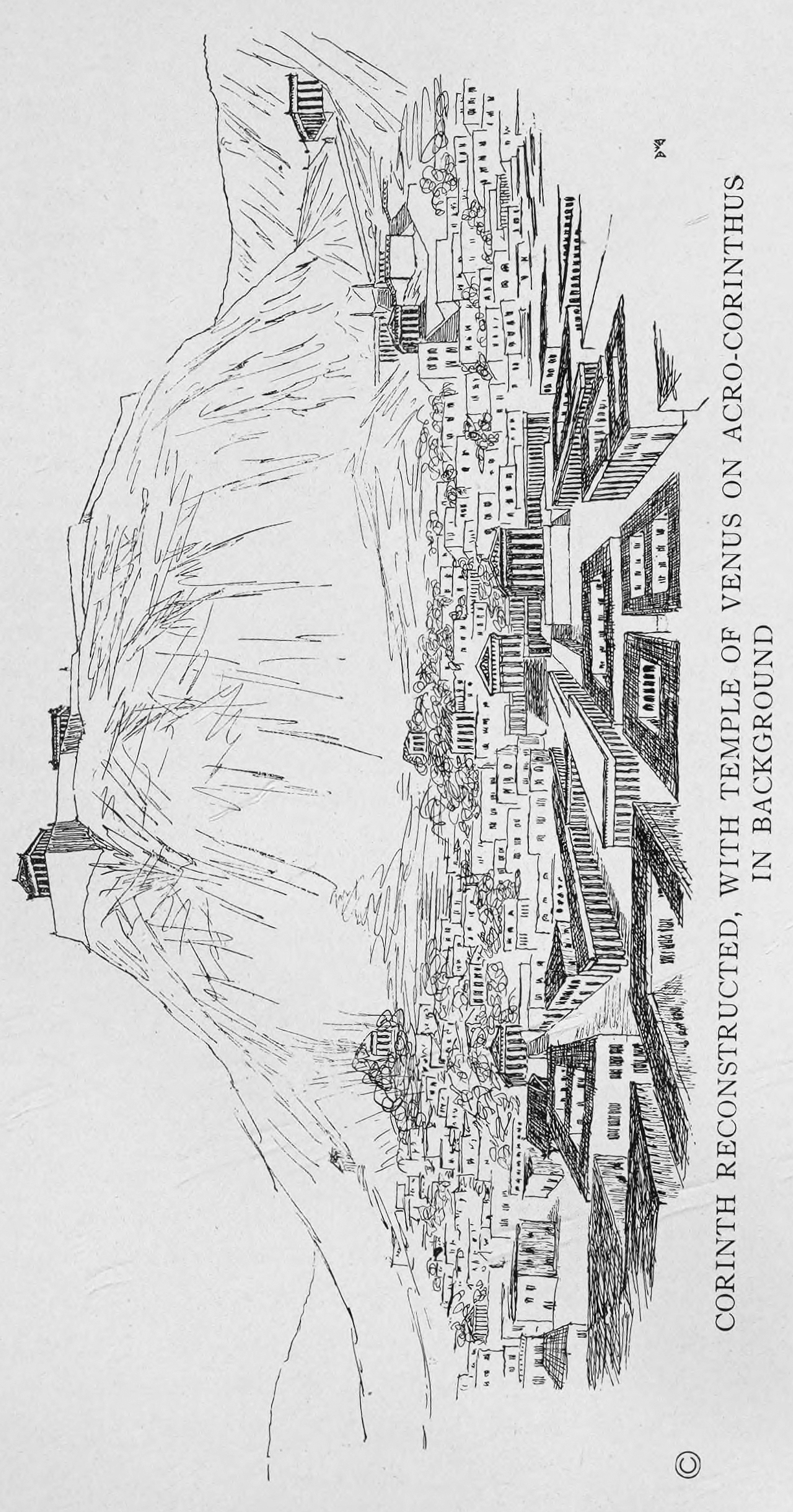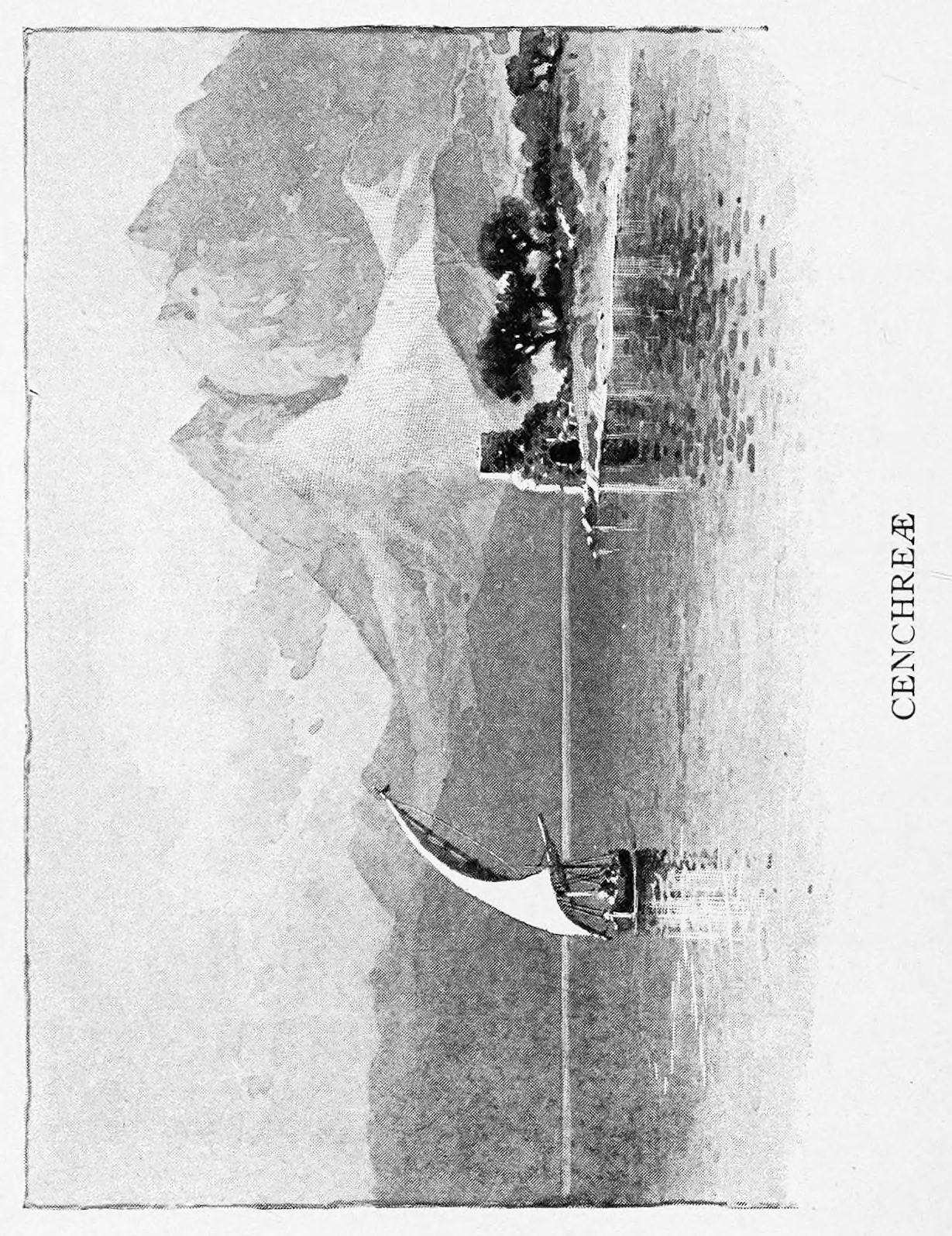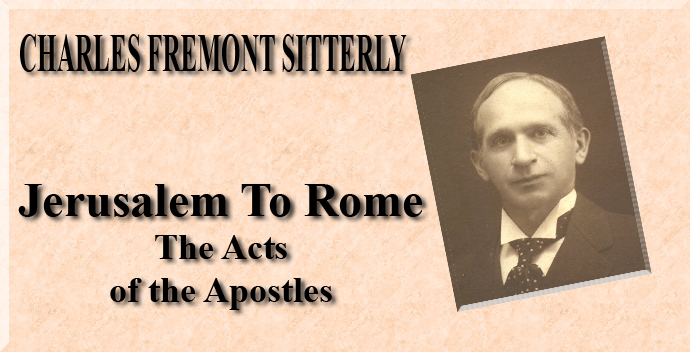The Second Missionary Tour
Continued
|
Translation
|
|
Commentary |
|
Paragraph 1. WORK AMONG THE JEWS AT CORINTH. Verses 1-6.
|
|
After this Paul left Athens and came to Corinth. And he found a Jew named Aquila, a native of Pontus, who had lately come from Italy with Priscilla his wife, because Claudius had ordered all Jews to depart from Rome. He went to their home and, because they belonged to the same trade as himself, remained with them, and they worked together, for they were tentmakers. Every Sabbath Paul used to debate in the synagogue and endeavor to persuade both Jews and Greeks. Thus when Silas and Timothy came down from Macedonia he was earnestly preaching the Word, witnessing in every way to the Jews that Jesus was the Christ. When, however, they set themselves to oppose and abuse him he shook his garment in protest, saying to them:
“Your blood be upon your own heads! I am clear of it; from now on I will go to the Gentiles.”
|
|
Paul seems to have recovered his physical strength at Athens before Silas and Timothy could get to him, and again we have need of claiming Luke’s presence, for it is not like Paul to travel alone, even though in good health. He evidently was also running short of funds, and as Corinth was a much more active labor center than Athens, wished to engage in his trade and not let his Macedonian friends know about his condition nor feel obligated to send him aid. It must be remembered that Paul had engaged in manual labor at Thessalonica, and that at least twice while he was there the Philippian church had sent him assistance. In any case, he now again wishes work and finds it in Corinth. Possibly, also, the lure of Rome seized him again, and he felt that if he were able to lay by a fund for the purpose before Silas and Timothy joined him, he might persuade them to go there with him. But Providence was blocking that purpose, for the Emperor Claudius at that very season was banishing from the capital every Hebrew. This brought to Corinth most opportunely that gifted Christian pair, Aquila and Priscilla, and Paul, making their acquaintance, probably at the synagogue where he spoke, attracted their attention and interest, was asked to their house, and, being a stranger, gladly accepted. Finding that he was also a tentmaker, they took him into their home and found him employment. We here see one of the sources of Paul’s wonderful knowledge of the personnel and state of the church at Rome as revealed in the last chapter of the Roman Epistle, which was written years before he himself saw Rome.
At Corinth Paul
found his field of work in the
synagogue for some time and was
so absorbed that by the time
Silas and Timothy came from
Macedonia, what with his daily
toil and Sabbath discussions
he was fast losing his buoyancy
of physical and mental spirit.
Though Apostle to the Gentiles,
Paul shows great wisdom in
laying a basis wherever possible
on solid Hebrew foundations.
Three Jewish institutions which
were thus utilized proved of
inestimable value both to Paul
and to Jesus in the early days
of Christianity—the Sabbath, the
synagogue, and the Scriptures.
With all his powers he appeals
to his own people first, and
everywhere advances very soon to
make fierce frontal attacks in
case they do not capitulate, and
at Corinth, as elsewhere, splits
the Jewish community into two
parties. Upon his opponents, who
can only meet him by abuse, he
turns and shakes the dust from
his garments, and says, “From
now on I go to the Gentiles.” |
Translation
|
|
Commentary |
|
Paragraph 2. TURNING TO THE CORINTHIAN GREEKS. Verses 7-11.
|
|
So he left and removed to the home of a devout worshiper named Titius Justus, whose house stood next door to the synagogue. Moreover, Crispus, the head of the synagogue, believed in the Lord, with his entire household, and as they kept listening many of the Corinthians believed and were baptized. And one night in a vision the Lord said to Paul,
“Have no fear, but keep on speaking, and by no means cease, for I am with you and no one shall attack you to your injury, for I have many people in this city.”
So he settled down there for a year and six months, teaching them the Word of God.
|
|
Of course Paul would hardly have taken so violent a leave of the synagogue unless the issue was very clear cut, and this appears to have been so from the fact that both Crispus, its official head, with his family, withdrew at the same time and that a Roman citizen, Gaius Titius Justus (compare Rom. xvi, 22), threw open his large house next door for worship, Justus himself and many other Corinthians taking their stand with Paul. That this outcome had, however, its sinister side is shown by the vision which was granted to Paul to encourage and strengthen him and the assurance that no attack, however venomous, should harm him or his influence. He therefore settles down for a prolonged campaign, and for the first time since leaving Antioch is permitted and encouraged by the Spirit to stay and work out the problem of conquering a pagan community of strategic importance. All in all, Paul’s experience in Corinth proved to be truly epoch-making both for him and for the early Christian faith. The letters he quite probably wrote from that church—First and Second Thessalonians and Romans, and some hold Galatians—during his two periods there and those he wrote to that church also, perhaps four in number, take up all of the greater problems of New Testament theology and church administration.
|
Translation
|
|
Commentary |
|
Paragraph 3. THE TRIAL BEFORE GALLIO, THE PROCONSUL. Verses 12-17.
|
|
But when Gallio became Proconsul of Achaia the Jews made a combined attack on Paul and brought him before the court.
“This fellow,” they said, “is persuading men to worship God contrary to law.”
As Paul was just about to begin his reply, Gallio answered the Jews:
“O you Jews! if it had been some crime or act of villainy I might have reasonably listened to you, but if these are questions of terms and names and matters of your own law, attend to them yourselves. In such matters . I am not willing to be judge.”
He even drove them from the court. Then they all fell upon Sosthenes, the head of the synagogue, and began to beat him right before the court, and Gallio paid not the least attention to it.
|
|
From a recent inscription found at Delphi it is learned that Junius Gallio, a brother of Seneca, the famous Roman statesman and philosopher, was Proconsul of the province of Achaia from the spring of A. D. 52 to 53, so that we have here a date in determining Paul’s time at Corinth. Paul had doubtless come to Corinth in the autumn of 51, and the action before Gallio fell soon after he came into office. The Jews, supposing that they could carry the case by main strength, failed to employ their ordinary method of laying the attack on civil grounds alone, and found in Gallio, who had so recently come from Rome and sympathized with the Emperor’s prejudice against them, one deaf to their clamor. Even Paul, though ready to defend himself, was not permitted to address the court; the case was thrown out and the lictors ordered to clear the
tribunal. The native Greeks, taking their cue from the new Proconsul, then fell upon the Jews, and Sosthenes, the successor to Crispus, as head of the synagogue, who no doubt was the most active leader of his party, received a mishandling which Gallio thought too insignificant to interfere with. Not only the verisimilitude but the historic accuracy of Luke’s record here is matter worthy of special remark.
|

CORINTH RECONSTRUCTED, WITH
TEMPLE OF VENUS ON ACRO-CORINTHUS
IN BACKGROUND |
Translation
|
|
Commentary |
|
Paragraph 4. THE RETURN AND REPORT TO JERUSALEM AND ANTIOCH. Verses 18-23.
|
|
Now, Paul stayed on quite a while after this, and then took leave of the brothers and sailed for Syria. With him were Priscilla and Aquila. He had his head shaved at Cenchreĉ because of a vow he had made. Then they came to Ephesus, and there Paul left them. He, however, went to the synagogue and had a discussion with the Jews. And when they asked him to stay longer he declined, but on leaving said,
“God willing, I will return to you again.” So he sailed from Ephesus and landed at
Caesarea, and when he had gone up and saluted the church in Jerusalem he went down to Antioch. And after he had spent some time there he started off again, passing from place to place through the country of Galatia and Phrygia, confirming all the disciples.
|
|
The outcome of his day in court must have gratified Paul and confirmed the conviction his vision had brought him. At any rate, he stayed right on at Corinth and kept on speaking with great success until quite probably another attack of his chronic ailment led him to desist. At Cenchreĉ, where Phoebe was a deaconess, he had his head shaved, possibly in token of a vow following deliverance from an attack of sickness. The Beza text also says he wished greatly to reach Jerusalem “before the coming Passover feast.” For some reason Aquila and Priscilla also leave on the same ship and go as far as Ephesus, Paul only going ashore while the ship was in port there, probably a Sabbath day. He visited, at all events, the synagogue and so interested the Jews that they pressed him to stay longer with them, but on account of his vow and other reasons Paul could only promise, God willing, to return there at some early day. Landing at last at Caesarea, he goes up to Jerusalem, fulfills his vow, exchanges greetings with the brethren, and at the end of the feast goes down to Antioch. Here Paul makes report of his nearly two years’ travel, and soon appears to have felt that his promise to Ephesus must be fulfilled. He therefore starts out early that same summer (A. D. 53) and goes overland, as in his second tour, as far as the western frontier of Phrygia, where he took the great Roman Road, directly across the Province Asia to Ephesus. Wherever his course coincided with former journeys he went slowly, preaching to the growing congregations and doing all he could to strengthen them, but after leaving Galatia he no doubt pushed on without stop to the coast.
|
Translation
|
|
Commentary |
|
Paragraph 5. THE MINISTRY
OF APOLLOS IN EPHESUS AND CORINTH. Verses 24-28.
|
|
Meantime an Alexandrian Jew by the name of Apollos had come to Ephesus. He was a learned man and powerful in his knowledge of the Scriptures. He had been orally instructed in the Way of the Lord, and, full of burning zeal, he would tell and accurately teach the facts about Jesus, though he was acquainted only with the
baptism of John. Now he began to speak openly in the synagogue, but when Priscilla and Aquila heard him they took him home and explained to him more accurately still the Way of God. Moreover, when he wished to cross over to Achaia the brothers wrote the disciples there, encouraging them to receive him cordially. And when he arrived there he was of great assistance to those who through the grace of God had believed, for he refuted the arguments of the Jews publicly with great force, demonstrating from the Scriptures that Jesus was the Christ.
|
|
From what we now know of the vast wealth and prominence of
Alexandria in the first century not alone in the Roman Political World but in the Greek World of Philosophy and Literature, it would have been passing strange if such a work as Luke’s had failed to record any reflection of these facts on the first generation of Christian history. There can be no doubt that the preachers and preaching of the gospel reached Alexandria soon after the Ascension, but the story of Luke, restricted to tracing the progress of the faith from Jerusalem to Rome, only refers to the African or other fields as they infringed upon that single line which naturally lay north of the Mediterranean Sea. Cyrene, Libya, Ethiopia, the Synagogue of the Alexandrians, all are mentioned, but only incidentally and in this way. Now comes a typical Alexandrian scholar, already a Christian and a convinced and eloquent defender of the Saviour as the promised Messiah. He crosses to Ephesus, the Greek rival of Alexandria, which with Corinth, and perhaps Antioch, made a combination of Greek cities as populous and powerful as any purely Greek cities had ever been, even in the most palmy days of the “glory that was Greece.” Apollos had a mind saturated with the letter and spirit of the Old Testament and his graceful manners and language, as he spoke the purest Greek, won him great favor in the synagogue at Ephesus. Aquila and Priscilla again, as at Corinth for Paul, do much for Apollos, and when he wishes to cross over to Corinth they give him letters to the leaders there, and there he has an even more happy and successful period of preaching, having had the tutelage of Aquila and Priscilla for a time at Ephesus.
|

CENCHREĈ |
|
|
|
|



 Home
Home What's New
What's New Bible
Bible Photos
Photos Hiking
Hiking E-Books
E-Books Genealogy
Genealogy Profile
Free Plug-ins You May Need
Profile
Free Plug-ins You May Need
 Get Java
Get Java.png) Get Flash
Get Flash Get 7-Zip
Get 7-Zip Get Acrobat Reader
Get Acrobat Reader Get TheWORD
Get TheWORD
